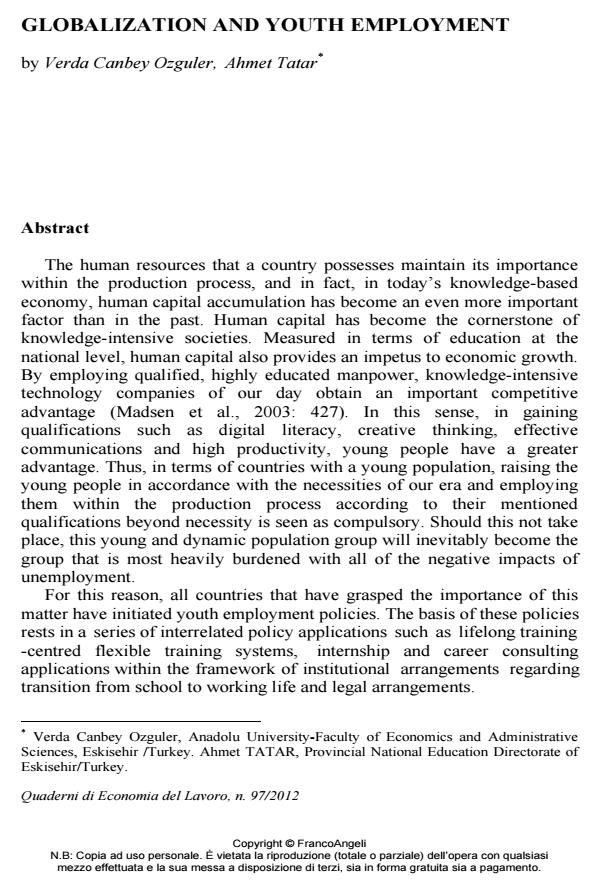Globalization and Youth employment
Titolo Rivista QUADERNI DI ECONOMIA DEL LAVORO
Autori/Curatori Verda Canbey Ozguler
Anno di pubblicazione 2012 Fascicolo 2012/97 Lingua Inglese
Numero pagine 20 P. 39-58 Dimensione file 820 KB
DOI 10.3280/QUA2012-097003
Il DOI è il codice a barre della proprietà intellettuale: per saperne di più
clicca qui
Qui sotto puoi vedere in anteprima la prima pagina di questo articolo.
Se questo articolo ti interessa, lo puoi acquistare (e scaricare in formato pdf) seguendo le facili indicazioni per acquistare il download credit. Acquista Download Credits per scaricare questo Articolo in formato PDF

FrancoAngeli è membro della Publishers International Linking Association, Inc (PILA)associazione indipendente e non profit per facilitare (attraverso i servizi tecnologici implementati da CrossRef.org) l’accesso degli studiosi ai contenuti digitali nelle pubblicazioni professionali e scientifiche
The human resources that a country possesses maintain its importance within the production process, and in fact, in today’s knowledge-based economy, human capital accumulation has become an even more important factor than in the past. Human capital has become the cornerstone of knowledge-intensive societies. Measured in terms of education at the national level, human capital also provides an impetus to economic growth. By employing qualified, highly educated manpower, knowledge-intensive technology companies of our day obtain an important competitive advantage (Madsen et al., 2003: 427). In this sense, in gaining qualifications such as digital literacy, creative thinking, effective communications and high productivity, young people have a greater advantage. Thus, in terms of countries with a young population, raising the young people in accordance with the necessities of our era and employing them within the production process according to their mentioned qualifications beyond necessity is seen as compulsory. Should this not take place, this young and dynamic population group will inevitably become the group that is most heavily burdened with all of the negative impacts of unemployment. For this reason, all countries that have grasped the importance of this matter have initiated youth employment policies. The basis of these policies rests in a series of interrelated policy applications such as lifelong training -centred f lexible t raining s ystems, in ternship a nd c areer consulting applications within the framework of institutional arrangements regarding transition from school to working life and legal arrangements. In this study, the place of youth in the labour market and employment issues is examined within the context of the globalisation process with examples from different countries. Additionally, policies that need to be developed during this process are mentioned and supported with concrete practical examples for developing recommendations, as well as considering the subject from other perspectives
Verda Canbey Ozguler, Globalization and Youth employment in "QUADERNI DI ECONOMIA DEL LAVORO" 97/2012, pp 39-58, DOI: 10.3280/QUA2012-097003